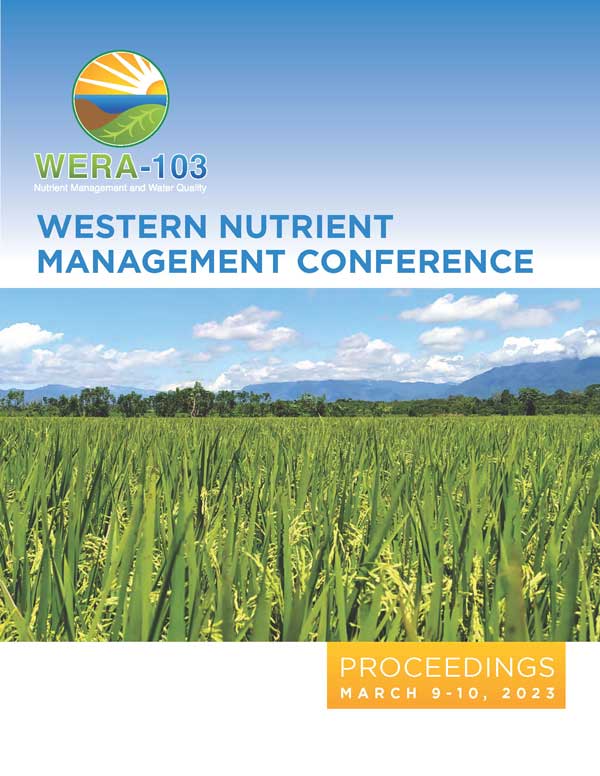Download the Conference Proceedings
Proceedings
Authors
| Filter results9 paper(s) found. |
|---|
1. Compost Application in California Tomato Cropping SystemsWith the implementation of California Assembly Bill (AB) 341 the availability of composts such as green waste (GW) and co-composted green waste and food waste (FW) as a soil amendment is increasing. The use of those organic amendments in agricultural production systems has been recommended as an effective strategy to make full use of organic waste and improve soil health. However, little information is available to tomato growers to reassess N inputs from using GW and FW. This study was conducted... Q. Yi, W. Horwath, S. Haas, X. Zhu-barker |
2. Dairy Manure and Fertilizer Effects on Microbial Activity of an Idaho SoilDairy manure applications that have occurred in the past can have long-term lingering effects on crop production. Understanding the cause is important for current and future management practices. This study was conducted to assess selected microbial activity among past manure application rates. In a past study (2014-2016) in Kimberly Idaho, historic manure applications have been shown to have significant positive and negative effects on sugar beet production. The manure treatment history... D.D. Tarkalson, R. Dungan, D. Bjorneberg |
3. Soil Health and Ecological Resilience on the PalouseHealthy soil is critical for global food security and other essential ecosystem services but is threatened by processes of soil degradation, with at least 33% of global croplands estimated to be moderately or highly degraded. Current soil health assessments provide insight into soil functional performance but often lack diagnostic criteria that assess management effects on soil function over time. We integrate soil health assessments with ecological resilience theory to better understand management... A.G. Davis, D.R. Huggins, J.P. Reganold |
4. Evaluating Cover Crops for Nitrogen Management in a Walnut OrchardCover crops provide numerous benefits in agricultural systems. From increasing soil water storage to reducing fertilizer inputs, quantifying cover crops benefits is crucial in nutrient management, crop productivity, environmental sustainability, and growers' adoption. The goal of this study was to quantify nitrogen (N) and carbon (C) inputs in a walnut (Juglans regia L. 'Chandler') orchard that implemented three cover crop mixtures. The study site was a 5-year-old walnut... D. Zapata, X. Zhu-barker, K. Steenwerth, W. Horwath |
5. Soil Respiration Tests As Predictors of Nitrogen Mineralization PotentialEstimation of seasonal N availability via a soil test has proved difficult. This information gap has lead to fertilizer recommendations based upon soil inorganic N levels found before planting and or preside dress. Complicating matters, as famers adopt new irrigation technologies, the results from older fertilizer rate trails may also be less applicable. In general, most when not all recommendations do not account for the contribution of soil N mineralization during the growing season, which has... W. Horwath |
6. Use of Biological Soil Tests to Assess Soil Health and ProductivityCrops require sufficient nitrogen (N) to attain maximum yield potential. The intrinsic N supplying potential of soils is both directly and indirectly related to soil health. Soil health can reliably be predicted with existing soil tests, however, the ability to predict soil N availability, an important proxy for soil health, remains problematic due to a lack of a robust soil tests. As a result, fertilizer recommendations are often made without an accurate assessment of the amount of N that... W. Horwath |
7. Non-dormant Alfalfa and Small Grain Rotations- Tillage and Fertility EffectsTo study the use of non-dormant and high nitrogen fixing alfalfa cultivars as a possible source of nitrogen for spring and fall-seeded wheat and barley grown under tilled and no-tilled conditions. Hi-Nitro, a non-dormant, high-nitrogen fixing alfalfa variety, and RoundUp Ready Stratica, a traditional dormant alfalfa cultivars were clear seeded in Aberdeen in 2023 and 2024. Forage was harvested 4 times. Fall or spring tillage was done approximately 3-14 days before planting fall or spring... R. Findlay, J. Spackman, J. Hatch, T. Jacobsen, J. Gibbons, J. Sagers, D. Callister |
8. Malt Barley Yield and Quality Response to Nitrogen and Sulfur FertilityNitrogen (N) and sulfur (S) and are critical nutrients for producing high-quality malt barley but can be difficult to manage in semi-arid production systems where rainfall and, periodically, irrigation is variable. High spring precipitation or excessive irrigation events can favor N and S leaching reducing yield and grain quality. However, N fertilizer additives such as urease inhibitors, nitrification inhibitors, and controlled-release products may improve N availability. Irrigated... J. Spackman, J. Spackman, J. Hatch, J. Bevan |
9. Lime Incubation for Southern Idaho SoilsSoil acidity is a growing concern for agricultural productivity in Idaho, particularly in the eastern and northern regions where soils are trending acidic. Soil acidity below a pH 5.5 adversely affects the root development and nutrient uptake of crops like alfalfa, barley, and wheat. This study aims to determine the lime requirements for acidic soils in Idaho to optimize crop growth, specifically targeting pH levels of 5.5, 6.0, 6.5, and 7.0. Soil samples were collected from various grower fields... K. Young, J. Spackman, T. Jacobsen, J. Sagers, J. Hatch, R. Ritchie, J. Williams, K. Schroeder, A. Adjesiwor |
